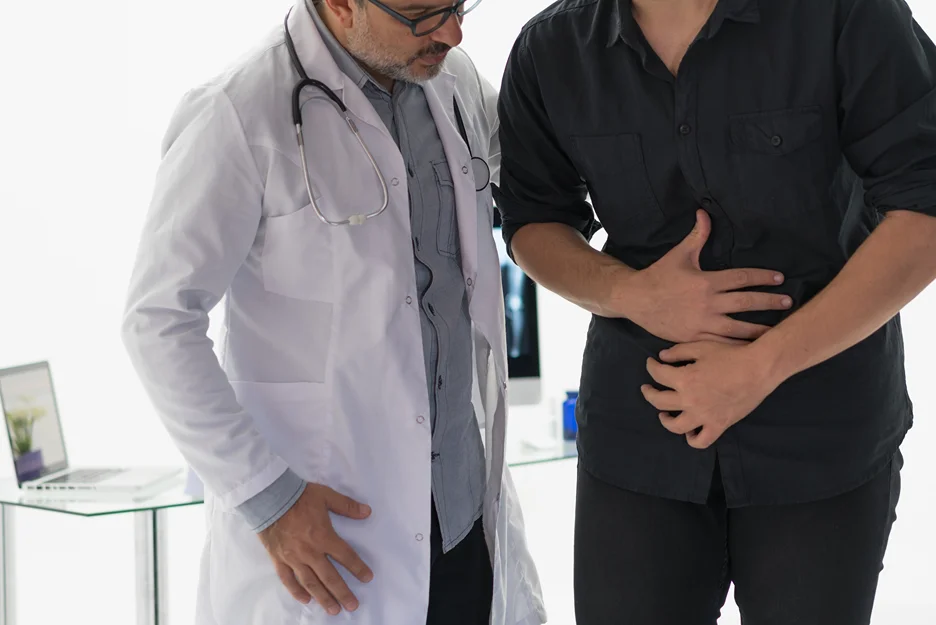Discover the reasons behind pain under your right breast that radiates to your back. Learn everything you need to know for relief.
So, you’ve been feeling that sharp pain under your right breast, making its way to your back, huh? It’s time to get to the bottom of what’s causing this discomfort.
From gallbladder and liver issues to muscle strains and pleurisy, there are a variety of factors that could be at play.
In this article, we’ll dive into the possible reasons behind the pain under your right breast, along with key insights into associated symptoms and treatments.
By understanding what might be triggering your discomfort, you can take proactive steps to seek proper medical evaluation and find the relief you deserve.
Gallbladder and Liver Issues

If you’re experiencing pain under your right breast radiating to your back, gallbladder issues or liver problems could be the underlying cause.
Gallbladder problems, such as gallstones or inflammation, can cause sharp, intense pain that radiates to the back. You might also experience discomfort after consuming fatty or greasy foods.
Liver issues, including hepatitis or fatty liver disease, can also manifest as pain under the right breast, often accompanied by feelings of fullness or discomfort in the abdomen.
It’s essential to seek medical attention if you suspect gallbladder or liver involvement, as prompt diagnosis and treatment are crucial for managing these conditions.
Your doctor can conduct various tests to determine the cause of your symptoms and recommend an appropriate treatment plan to address your specific needs.
Costochondritis Explained
Costochondritis causes inflammation of the cartilage connecting your ribs to the breastbone, leading to pain under the right breast radiating to your back.
This condition can be distressing, but understanding it can provide reassurance.
Understanding costochondritis empowers you to seek appropriate care and manage any emotional challenges that may arise.
Muscle Strains Impact
Muscle strains can cause significant discomfort under the right breast, often radiating to the back, impacting your daily activities and physical well-being.
When these muscles are strained, it can lead to sharp and persistent pain, making it challenging to perform routine tasks. Muscle strains may also result in tenderness and swelling, further affecting your comfort and mobility.
Engaging in physical activities or even simple movements might exacerbate the pain, hindering your ability to enjoy everyday life. Seeking prompt medical attention is crucial to address the strain and prevent it from worsening.
Furthermore, muscle strains can lead to restricted movement and affect your posture, potentially leading to additional discomfort and musculoskeletal issues.
Pleurisy Explained
Pleurisy can cause sharp pain under your right breast and in your back, making it difficult to take deep breaths and leading to discomfort with movement.
Pleurisy, also known as pleuritis, occurs when the double-layered membrane (pleura) surrounding the lungs becomes inflamed.
This inflammation can lead to intense chest pain, especially when breathing deeply, coughing, or sneezing. It is essential to understand the potential causes and treatments for pleurisy to effectively manage the condition.
| Causes of Pleurisy | Symptoms of Pleurisy | Treatments for Pleurisy |
| Viral infections | Sharp chest pain exacerbated by breathing | Rest and over-the-counter pain relief |
| Bacterial infections | Difficulty breathing | Antibiotics and anti-inflammatory medications |
| Fungal infections | Dry, nonproductive cough | Drainage of infected fluid |
| Pulmonary embolism | Fever and chills | Addressing underlying cause |
| Rib fractures | Rapid, shallow breathing | Steroids for pain and inflammation |
Understanding the underlying cause of pleurisy is crucial for effective treatment. If you experience persistent chest pain, difficulty breathing, or other concerning symptoms, seek medical attention promptly.
Hiatal Hernia Complications
One potential complication of a hiatal hernia is the reflux of stomach acid into the esophagus, causing heartburn and discomfort in the chest and back.
- This reflux can lead to inflammation and irritation of the esophagus, known as esophagitis, causing pain and difficulty swallowing.
- It may also result in the development of ulcers in the esophagus, leading to further discomfort and potential complications.
- In severe cases, chronic exposure to stomach acid can increase the risk of developing Barrett’s esophagus, a condition that predisposes individuals to esophageal cancer.
These complications highlight the importance of managing hiatal hernias to prevent the reflux of stomach acid and its potential impact on the esophagus. Seeking medical attention for effective treatment and monitoring is crucial to mitigate these risks.
Pneumonia Symptoms

What are the typical symptoms of pneumonia that may cause pain under the right breast and in the back?
Pneumonia can manifest with symptoms such as chest pain, especially when breathing deeply or coughing. This pain can be located under the right breast and may also radiate to the back.
Other common symptoms of pneumonia include fever, chills, shortness of breath, cough with phlegm or pus, fatigue, and nausea.
In severe cases, pneumonia can lead to confusion, bluish skin color, and severe breathing difficulties.
If you experience persistent chest pain, particularly when accompanied by these symptoms, seeking medical attention is crucial.
Prompt diagnosis and treatment are essential for managing pneumonia effectively and preventing potential complications.
Pulmonary Embolism Risks
The pulmonary embolism risks associated with pain under the right breast and in the back include factors such as prolonged immobility, surgery, and a history of blood clotting disorders.
When it comes to prolonged immobility, such as long flights or bed rest, the risk of blood clots increases.
Recent surgeries, especially orthopedic or cancer-related procedures, can elevate the likelihood of developing a pulmonary embolism.
Individuals with a history of blood clotting disorders, such as deep vein thrombosis, are at a higher risk of experiencing a pulmonary embolism.
It’s important to be aware of these risks, especially if you’re experiencing pain in the specified areas, and seek medical attention promptly if you have concerns about potential pulmonary embolism.
Mastitis and Breastfeeding
If you’re experiencing breast pain while breastfeeding, it’s important to recognize the symptoms of mastitis and seek prompt medical attention. Mastitis is often caused by a blocked milk duct or bacteria entering the breast tissue through a cracked or sore nipple.
Symptoms include a painful, swollen lump in the breast, redness, warmth, and flu-like symptoms such as fever and chills.
It’s essential to continue breastfeeding or expressing milk to help clear the blockage and relieve the symptoms. Applying warm compresses and massaging the affected area can also provide relief.
However, if symptoms persist or worsen, it’s crucial to consult a healthcare professional. Prompt treatment, often including antibiotics, can help resolve mastitis and prevent complications, ensuring you can continue breastfeeding comfortably.
Rib Injury Causes
Experiencing a sharp pain under your right breast can sometimes be attributed to rib injuries, often caused by accidents, falls, or severe coughing, leading to discomfort and tenderness in the affected area.
Rib Injury Causes:
- Accidents: Falls, sports-related injuries, or car accidents can lead to rib fractures or bruising.
- Severe Coughing: Intense and prolonged coughing fits can strain or fracture ribs, causing localized pain.
- Repetitive Strain: Overuse or repetitive movements, common in certain occupations or activities, can result in rib stress fractures.
These injuries can cause pain under the right breast, and the discomfort may radiate to the back. Seeking medical attention is important to properly diagnose and manage rib injuries, ensuring a prompt and effective recovery.
When to Seek Help

Seek prompt medical attention if the pain under your right breast radiating to your back worsens or is accompanied by difficulty breathing, coughing up blood, or confusion and dizziness.
Additionally, if the pain becomes severe, persists, or interferes with your daily activities, it’s essential to seek medical help.
Chest pain that radiates to other parts of your body, especially your left arm, shouldn’t be ignored. Severe, sharp, or sudden chest pain warrants immediate medical evaluation.
Any of these symptoms could indicate a potentially serious condition that requires prompt medical assessment. Don’t hesitate to seek help if you experience any of these warning signs.
Your health and well-being are paramount, and timely medical attention can ensure proper diagnosis and treatment.
